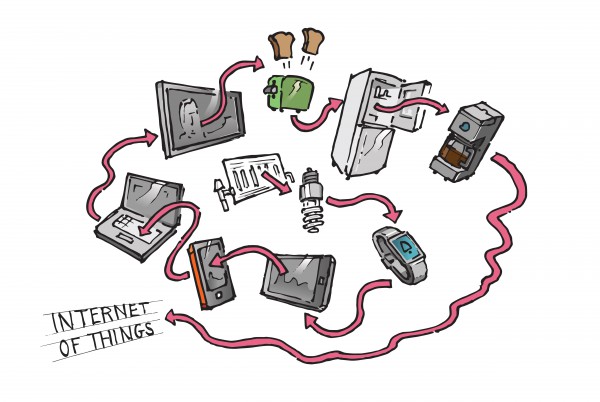
There are a lot of technology buzzwords and phrases being thrown around lately, such as "Cloud" and "Wearables", but the one I see gaining the most traction is "Internet of Things". The concept is pretty simple -- things being connected to the Internet, but what exactly is defined as a "thing". Well, pretty much anything that isn't a traditional computer can qualify. Think outside the box for a moment and imagine things like your bed, a toaster or a vacuum cleaner being connected to the Internet. Maybe an internet-connected bed can upload logs of your sleep patterns, a toaster can tell you that breakfast is ready, or your vacuum might warn you to to clean the filter.
Unfortunately, as cool as this is, it presents a big problem -- who will decide the standards, and how can we be sure that it is all safe? After all, you do not want a vulnerability in an Internet-connected refrigerator compromising your entire network. Have no fear however, ARM has stepped up with its solution -- the mbed platform which focuses on open standards.
"The ARM mbed IoT Device Platform has been built around open standards and will bring Internet protocols, security and standards-based manageability into one integrated solution optimized for energy and cost-constrained devices. It is supported by the established and expanding mbed hardware and software ecosystem that will provide common building blocks for IoT devices and services. This new platform will accelerate the growth of the IoT by enabling innovators to focus on value-add features and differentiation", says ARM.
The company further explains, "the mbed partner ecosystem has been expanded to enable participation by a wide range of silicon, module, original equipment manufacturer (OEM), system integrator, cloud and operator partners. Launch partners for the mbed IoT Device Platform include Atmel, CSR, Ericsson, Farnell, Freescale, IBM, KDDI, Marvell, MegaChips, MultiTech, Nordic Semiconductor, NXP, Renesas, SeeControl, Semtech, Silicon Labs, Stream Technologies, ST, Telenor Connexion, Telefonica, Thundersoft, u-blox, wot.io and Zebra".
The company explains the three facets of the mbed platform:
- mbed OS: a free operating system for ARM Cortex-M processor based devices that consolidates the fundamental building blocks of the IoT in one integrated set of software components. It contains security, communication and device management features to enable the development of production-grade, energy-efficient IoT devices. It is available to mbed partners in Q4 2014 for early development, with the first production devices due in 2015.
- mbed Device Server: a licensable software product that provides the required server-side technologies to connect and manage devices in a secure way. It also provides a bridge between the protocols designed for use on IoT devices and the APIs that are used by web developers. This simplifies the integration of IoT devices that provide “little data” into cloud frameworks that deploy 'big data' analytics on the aggregated information. Built around open standards, the product scales to handle the connections and management of millions of devices
- mbed.org: the focus point for a community of more than 70,000 developers around mbed. The website provides a comprehensive database of hardware development kits, a repository for reusable software components, reference applications, documentation and web-based development tools.
ARM is saying all the right things and has partnered with some significant players. However, if the Internet of Things will be as popular as many believe, there will be a lot of competition. Even if this platform makes sense, the question should be, who put ARM in charge anyway? I'm sure many other companies have their own ideas on how the Internet of Things should be handled. Quite frankly, we will probably see many competing platforms and live in incompatibility hell for years until one platform "wins".
Who do you think should be responsible for governing the Internet of Things? Tell me in the comments.
Photo credit: Scott Bedford/Shutterstock

